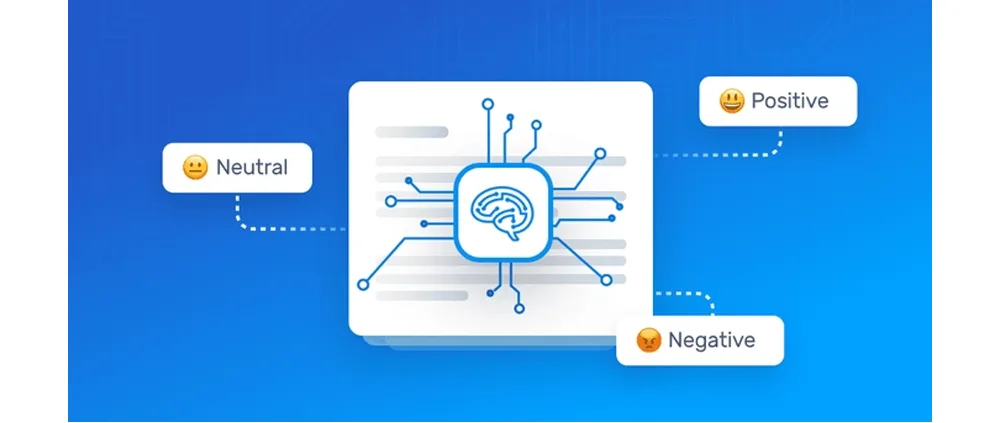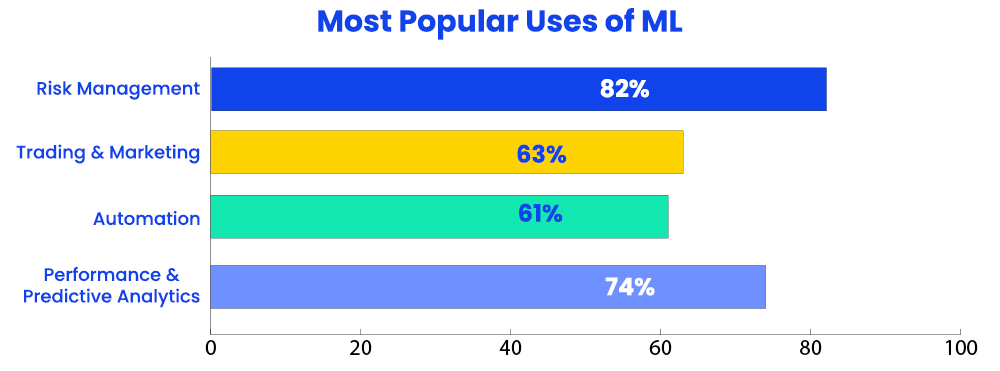Expert Interviews
- University Reviews
- Career Guide
 Video Counseling
Video CounselingImportant Facts
- Ask any Question - CV Forum

Top 15 Machine Learning Examples & Applications
College Vidya Team Jan 15, 2025 1.3K Reads

With the growing popularity of the term “machine learning” in popular discourses, the technologies applications and examples of use cases have also become a topic of much interest, especially to AI enthusiasts and computer scientists. While a person acquainted with ML in a limited capacity may envision it to be an intangible, complex and highly advanced technology with complex applications, the uses of machine learning in our day-to-day life are much more widely spanned than is realised.
In this blog, we take a look into the diverse myriad of industries and day-to-day domains in which machine learning models and technologies contribute to the strengthening of the technological service/application. Continue reading to explore more about some of the important examples of ML in everyday life as well as critical industries.
What is Machine Learning & How Does It Work?
Machine learning is a pillar of the domain of artificial intelligence, and its primary function revolves around the development and training of models guided by algorithms and statistical domains to make accurate predictions and improve decision-making by the model. Machine learning is concerned with the training of models and AI programs to make the most efficient and accurate decisions and solutions based on data analytics of vast datasets. Thus, machine learning technologies involve the suggestions and decision-making based on insights gained from fed datasets rather than direct instructions of performance.
|
|
|
|
|
|
|
|
|
|
|
|
|
|
|
|
|
|
|
|
|
|
|
|
ML models and technologies work by putting statistical techniques to use in the analysis of vast datasets. The ML model then identifies trends, patterns and analytical insights in the data, which are used to predict and guide decision-making and problem-solving in softwares and applications. Over time, with new data being generated through various users of the platform, the ML model continues further autonomous learning and becomes increasingly accurate in the predictions made.
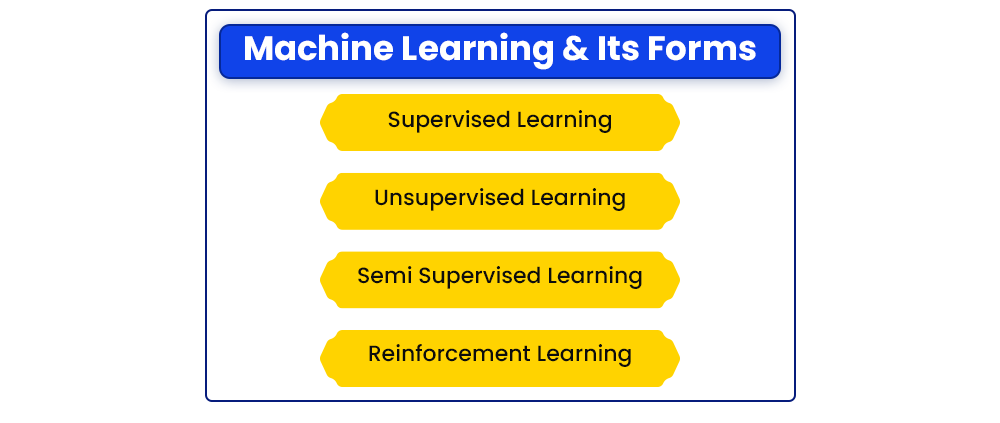
Thus, the field of machine learning is closely tied to AI as well as data science and analytics, and provides a strong impetus for the use of data-driven mechanisms in computer science for strengthening technological services.
Top 10 Examples of Machine Learning in Everyday Life
While many users of machine learning and technology enthusiasts may acknowledge the various domains where it finds its usages, the pervasiveness of ML technologies and their services in the day to day lives of people are underappreciated.
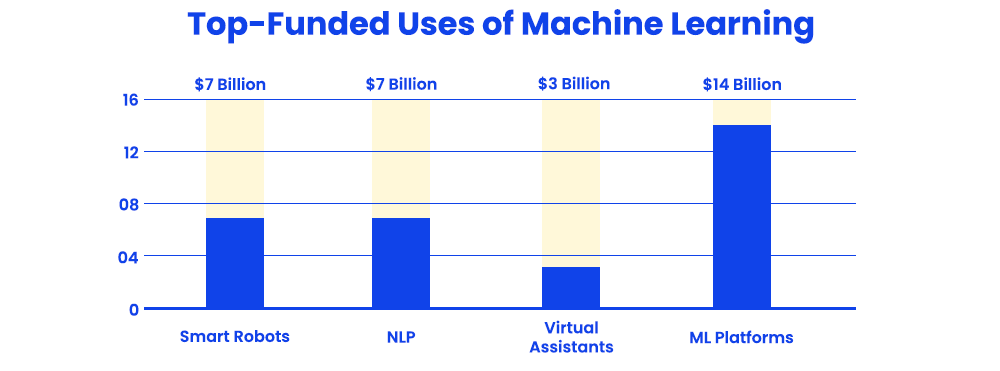
Source: https://financesonline.com/machine-learning-statistics/
Here we have elaborated upon a few of the prominent domains of everyday functioning wherein machine learning makes a significant contribution.
1) ML in Customer Services
Machine learning technologies are being deployed in customer services through artificial intelligence tools and softwares. These softwares and customer service chatbots are strengthened by integrated ML features. Machine learning has important implications for natural language processing, which is utilised in automated customer service bots. Speech recognition technologies equipped with ML models are also often utilised to understand user and customer intent and accordingly provide solutions to their problems based on such analysis.

Artificially intelligent virtual assistants used for addressing customer queries in real time also have integrated machine learning models to strengthen the technological foundation of the assistant.
2) ML in Personalised Suggestions for Users
One of the main purposes of utilising a machine learning model in a software/application is to be able to derive meaningful data insights from available user information in datasets and further use them to provide personalised suggestions and solutions for each user. With the use of statistical techniques and models, ML makes predictions about user preferences, choices and desirable solutions on the basis of their past data. Hence, a number of applications including video streaming platforms, music platforms, lifestyle applications, social media etc. make use of ML to provide the most relevant solutions and personalised suggestions to the users.
3) ML in Marketing & Sales
Marketing and sales, especially in the digital and virtual domains rely on machine learning technologies to derive analytical insights about consumer data, provide personalised solutions and product suggestions to users, present relevant ads suited to customer needs, generate leads, identify dormant leads, monitor marketing campaigns, their reach and success and so on.
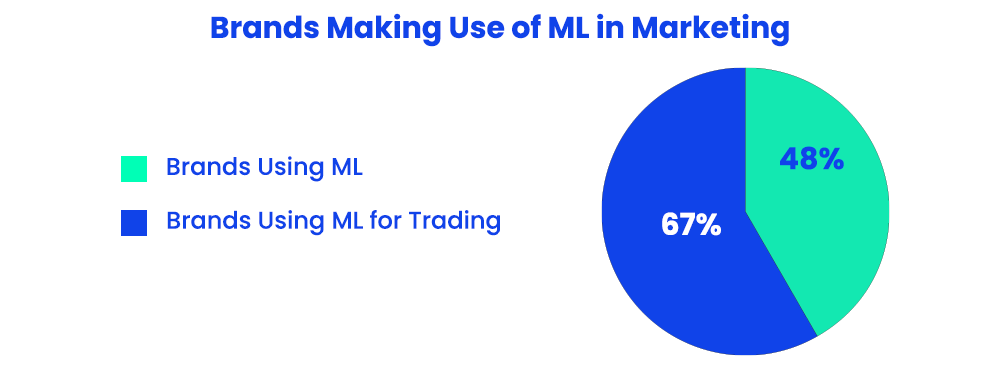
Source: financesonline.com & explodingtopics.com
Thus, the applications of ML in marketing and sales departments are currently on the rise with a large number of enterprises identifying the potential of machine learning in being utilised in data analytics and automating the processes surrounding effective marketing.
4) ML in Virtual Assistants
Speech recognition, natural language processing, provision of data-backed solutions, predictions of user preferences based on analytics on datasets, translation from text to speech (or vice versa) etc. are a few of the ways in which ML technologies are integrated into virtual assistants.

Source: https://financesonline.com/machine-learning-statistics/
5) ML in e-Mail Filtering & Spam Detection
6) ML in Transportation
7) ML in Prediction & Recommendation Applications
8) ML in Language Translation
9) ML and Automation of Professional Operations
10) ML and Sentiment Analysis
5 Crucial Applications and Uses of Machine Learning
Source: https://financesonline.com/machine-learning-statistics/
Elaborated here are a few instances of the significant and indispensable contributions that ML makes in some of the crucial industries.
1) ML in Finance & BFSI Industry
The applications of machine learning in the finance and BFSI sector is highly crucial for detection of potential financial frauds and curbing them. Based on vast datasets about financial records and transactions, ML models are able to identify trends and insights about account holders’ financial patterns and transactions. With such insights, it is equipped to quickly identify any unusual data patterns, interactions suggesting potential fraud as well as protect financial databases and information from hackers. This is one of the crucial domains in which the contributions of ML technology enables heightened protection of financial resources and data of users.
2) ML in Cybersecurity and Fraud Detection Services
As has been outlined in the uses of ML in financial and BFSI sectors, it finds applications in security and vigilance. In addition to spotting potential frauds and safeguarding users and enterprises from them, ML is also highly instrumental in the cybersecurity domain. Common uses of machine learning algorithms in cybersecurity include those like endpoint security, malware detection, anomaly detection, producing automated threat responses (ATRs) etc.
3) ML in Surveillance and Recognition
Since ML algorithms are integrated into facial recognition systems, speech recognition systems etc. They are also put to use in biometric surveillance, security recognition and related services and applications. The role of ML in surveillance and recognition is put to use in the military and defence sectors, for fraud detection, biometric vigilance measures, for predictive maintenance of existing vigilance systems and so on.
4) ML in Healthcare
The healthcare industry, especially domains of health maintenance, diagnosis and biofeedback are making significant use of machine learning algorithms and models. For the purpose of maintaining health and treatment planning, ML-powered smart applications are available which provide regular feedback and reminders to patients about their health.
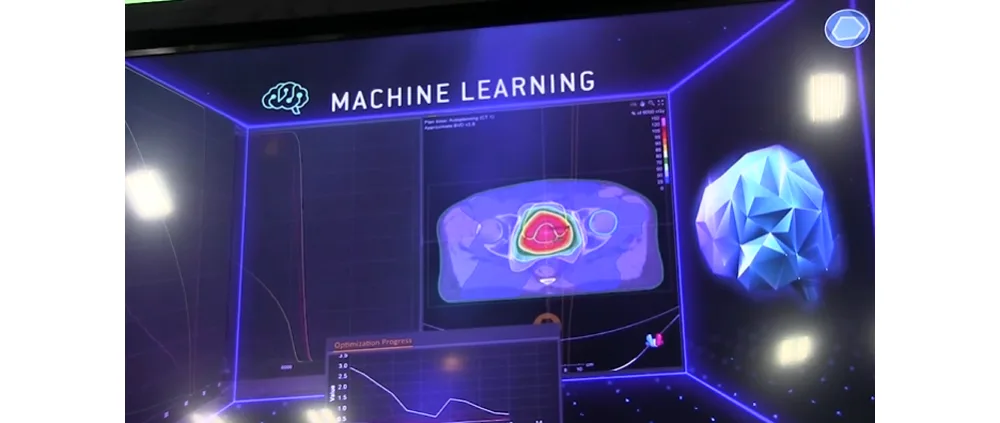
In the case of medical imaging and diagnosis, many advanced medical softwares have integrated ML technologies to strengthen their diagnostic accuracy. Furthermore, health risk predictive applications of machine learning are also significant for the healthcare and medical industry.
5 ) ML in Predictive Analytics
Through the various applications and examples of machine learning discussed in so far, the strength and powers of ML in prediction is indisputable. The use of machine learning for predictive analytical cases are common in risk predictions in healthcare, stock and shares price applications, for business growth and strategization and so on. Thus, predictive analytics are an overarching essential example of machine learning and its power for transforming the life of individuals and functioning of organisations.
Conclusion
As has been delineated in this blog, the uses and applications of machine learning technologies are not only diverse and widespread but also crucial in certain industries such as healthcare, financial and BFSI sectors, cybersecurity, vigilance etc. The contributions being made by ML in strengthening AI models and services promise bright prospects for the future.
Trending Articles
|
|
|
|
|
|
|
|
|
|
|
|
|
|
|
|
|
|
|
|
|
|
|
|
|
|
|
|
|
|
|
|
|
FAQs (Frequently Asked Questions)
The most common and prominent example of machine learning is its use for prediction and data analytics in order to provide relevant suggestions for connections and networking in social media applications. When social media applications provide personalised suggestions of connecting with individuals you might know, ML algorithms are used to crawl vast datasets of user datasets to predict potentially common contacts and provide customised suggestions to each user.
Yes, machine learning systems indeed find usage in the healthcare and medical sector for a number of purposes such as medical imaging and diagnoses, personal health management, health risk prediction, treatment planning and so on.
The most common everyday examples of machine learning include the personalised recommendations of videos, music and connections provided on video streaming, music streaming and social media applications. The predictions and data insights gathered by ML models are used to train the softwares in these applications to come up with the most relevant suggestions for each user.
A common example of artificial intelligence and machine learning includes the AI-powered chatbots like Google Bard and Chat GPT, which are equipped with ML algorithms to strengthen their abilities to provide relevant replies and answers to inputs as well as process natural language more effectively.
Some of the prominent real world examples of machine learning include their use in social media platforms, in real-time translations, in medical imaging and diagnostics, in financial fraud detection, email filtering and spam detection and so on.

Idea Alchemist / Concept Creator / Insight Generator
We are an online education platform where users can compare 100+ online universities on 30+ X-factors in just 2 minutes. With an active CV community, we have transformed online learning to quite an extent. With the CV Subsidy scheme, we contributing to GER in India while helping our learners with their finances in their “Chuno Apna Sahi” journey!
Every query is essential.
Our team of experts, or experienced individuals, will answer it within 24 hours.
Recommended for you
Tired of dealing with call centers!
Get a professional advisor for Career!
LIFETIME FREE
Rs.1499(Exclusive offer for today)

Pooja
MBA 7 yrs exp

Sarthak
M.Com 4 yrs exp

Kapil Gupta
MCA 5 yrs exp
or



Career Finder
(Career Suitability Test)
Explore and Find out your Most Suitable Career Path. Get Started with our Career Finder Tool Now!
ROI Calculator
Find out the expected salary, costs, and ROI of your chosen online university with our free calculator.

